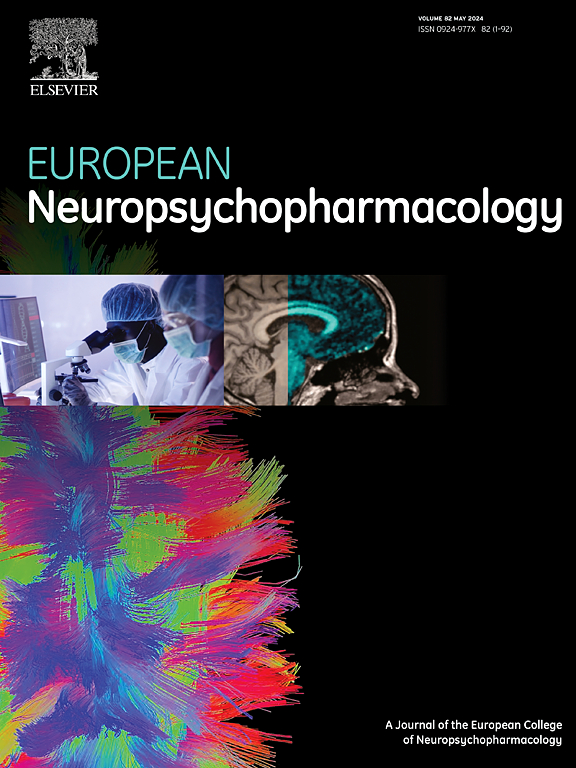精神疾病多基因精细图谱的最新研究成果
IF 6.1
2区 医学
Q1 CLINICAL NEUROLOGY
引用次数: 0
摘要
全基因组关联研究(GWAS)能确定相关变异,但不能说明全部问题。这些关联的绝大多数目标基因仍然未知。没有这些基因,就不可能充分获得基因研究的益处,例如更好地了解疾病机制和发现新的药物靶点。由于风险变异之间的连锁不平衡(LD)、对大脑中非编码调控机制的不完全了解以及大多数精神疾病的高度多基因结构,将全基因组重要(GWS)位点转化为因果基因和机制对于精神疾病(PD)来说尤其具有挑战性。因此,利用相关组织和细胞类型进行系统分析,应用精细图谱共同鉴定和验证一组可信的多发性硬化症因果变异和基因至关重要。然而,大多数精细图谱研究都集中在遗传学上确定的欧洲(EUR)血统的个体上;大多数已确定的病因变异,尤其是非编码变异的功能影响仍不清楚。在本次研讨会上,我们将展示如何整合来自不同血统的数据和前沿统计遗传学技术,以提高精细图谱的分辨率,并优先选择高置信度的病因变异和病因基因。具体来说,我们将从四个不同角度展示创新和见解:(i) 在祖先多样性样本(包括非洲、东亚和南亚祖先以及西班牙/拉丁美洲样本)中对重度抑郁障碍(MDD)进行的首次大规模精细图谱绘制和基因优先排序研究的结果(Karoline Kuchenbaecker 教授),(ii) 整合一套精细图谱绘制方法和新型单核基因表达数据,以揭示双相情感障碍(BD)等复杂疾病的遗传病因学(Maria Koromina 博士)、(iii) 利用先进的统计遗传学技术,如多基因优先级评分(PoPS)的实施和机器学习模型,从精神分裂症(SCZ)的多家系基因精细图谱中获得最新见解(Karl Heilborn博士),(iv) 利用结合功能基因组学注释(SBayesRC)的多基因风险评分新方法,改进包括躁狂症在内的复杂性状的精细图谱(曾健博士)。最后,Naomi Wray教授将总结多基因组学和多组学辅助精细图谱绘制领域的现状,并展望未来研究以及将研究成果转化为临床预测、治疗和预防的关键步骤。本文章由计算机程序翻译,如有差异,请以英文原文为准。
LATEST INSIGHTS FROM MULTI-ANCESTRY FINE-MAPPING IN PSYCHIATRIC DISORDERS
Genome-wide association studies (GWAS) identify associated variants but do not tell the whole story. The vast majority of target genes of these associations remain unknown. Without them it is impossible to fully reap the benefits of genetic research, such as better understanding of disease mechanisms and discovery of novel drug targets. Translating genome-wide significant (GWS) loci into causal genes and mechanisms is particularly challenging for psychiatric disorders (PD) due to linkage disequilibrium (LD) between risk variants, incomplete understanding of the non-coding regulatory mechanisms in the brain, and the highly polygenic architecture of most PDs. Therefore, a systematic analysis that applies fine mapping to jointly identify and validate a credible set of causal variants and genes for PDs using relevant tissues and cell types is critical. However, most fine-mapping studies have focused on individuals of genetically determined European (EUR) ancestries; with the functional impact of most identified causal variants, especially the non-coding variants, remaining unclear. A crucial progression is inclusion of diverse populations in PD GWAS and utilize the characteristics of diverse ancestral groups the to empower identification of target genes and mechanisms.
In this symposium, we will demonstrate how we can integrate data from diverse ancestries and cutting-edge statistical genetics techniques to improve the fine-mapping resolution and prioritize high confidence causal variants and genes for PDs. Specifically, we will showcase innovations and insights from four different perspectives: (i) results from the first large-scale fine-mapping and gene prioritization study of major depressive disorder (MDD) in an ancestrally diverse sample, including individuals of African, East Asian and South Asian ancestry, and Hispanic/Latin American samples (Prof Karoline Kuchenbaecker), (ii) integration of a suite of fine-mapping methods and novel single nuclei gene expression data to unravel the genetic etiology of complex disorders such as bipolar disorder (BD) (Dr Maria Koromina), (iii) latest insights from multi-ancestry fine-mapping in schizophrenia (SCZ) using advanced statistical genetics techniques such as implementation of the Polygenic Priority Score (PoPS) and machine-learning models (Dr Karl Heilborn), (iv) leveraging a new method for polygenic risk scoring which incorporates functional genomics annotations (SBayesRC) to improve fine-mapping of complex traits including PDs (Dr Jian Zeng). Finally, Prof. Naomi Wray will summarize the state of the field with regards to multi-ancestry and multi-omics aided fine-mapping and provide perspectives on future research and the crucial next steps to translate results to clinical prediction, treatment, and prevention.
求助全文
通过发布文献求助,成功后即可免费获取论文全文。
去求助
来源期刊

European Neuropsychopharmacology
医学-精神病学
CiteScore
10.30
自引率
5.40%
发文量
730
审稿时长
41 days
期刊介绍:
European Neuropsychopharmacology is the official publication of the European College of Neuropsychopharmacology (ECNP). In accordance with the mission of the College, the journal focuses on clinical and basic science contributions that advance our understanding of brain function and human behaviour and enable translation into improved treatments and enhanced public health impact in psychiatry. Recent years have been characterized by exciting advances in basic knowledge and available experimental techniques in neuroscience and genomics. However, clinical translation of these findings has not been as rapid. The journal aims to narrow this gap by promoting findings that are expected to have a major impact on both our understanding of the biological bases of mental disorders and the development and improvement of treatments, ideally paving the way for prevention and recovery.
 求助内容:
求助内容: 应助结果提醒方式:
应助结果提醒方式:


